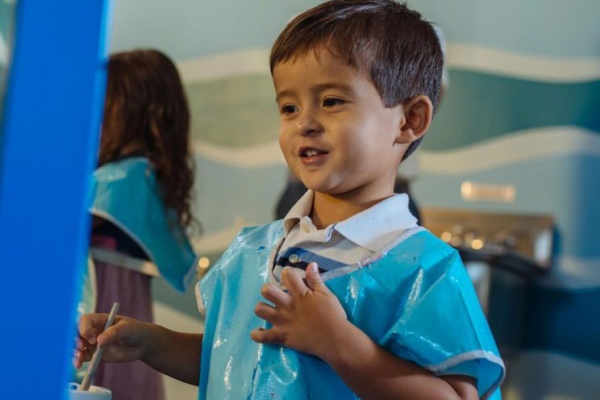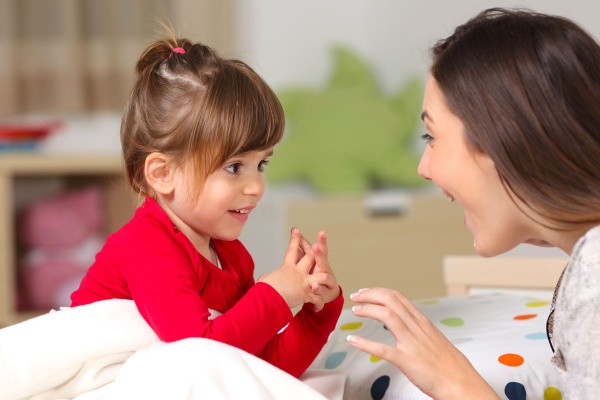

Can You Teach Your Baby to Read?
 I saw a commercial the other day that made my skin crawl. You’ve probably seen it – the one with parents holding up flashcards for their babies. In the video, the babies appear to be "reading."
I saw a commercial the other day that made my skin crawl. You’ve probably seen it – the one with parents holding up flashcards for their babies. In the video, the babies appear to be "reading."
It makes me crazy to think of teaching babies to read. It’s just kooky talk to me. But, because I’m an educator, and because I believe in research, and because I don’t want to make a fool of myself, I decided to look for answers before I wrote about it.
This newest infomercial craze, Your Baby Can Read, promises to teach infants and toddlers to read, giving them a jumpstart on their education. The Web site claims:
“A baby’s brain thrives on stimulation and develops at a phenomenal pace…nearly 90 percent during the first five years of life! The best and easiest time to learn a language is during the infant and toddler years, when the brain is creating thousands of synapses every second – allowing a child to learn both the written word and spoken word simultaneously, and with much more ease.”
Well … kind of. Nothing they’re saying is untrue, it just doesn’t really apply to what they're selling.
Here’s the truth. The early years are indeed the best time to learn language. Not only that, it’s the ONLY time language can be acquired. Studies have shown if a child is deprived of exposure to language during this vital time, the window closes. Second languages can be learned after this age, but it’s much more difficult and the later developed brain just isn’t wired for language acquisition.
A little background lesson. Research (love research!) tells us people learn to read (and continue to do so) by a combination of two methods: Phonics (word sounds) and sight words (as in flash cards). When beginning to read, we rely heavily on letter sounds, but as we become more familiar with words we automatically memorize them. We’ve all seen that little blurb, typically sent as an e-mail, with the words purposely misspelled; yet you were able to read it. That’s your brain overriding phonics and making sense of reading through sight words. Yet when you come to unfamiliar words, even as an adult, you revert to what you learned in primary school about letter sounds. We all do it. Go ahead and try to sight read "jardiniere," which, by the way, is a type of flower stand. There, you learned your lesson for the day. You’re welcome.
What
Well-intentioned parents believe, as the infomercial touts, hanging flash cards in their babies’ faces will aid them later in life by getting them a head start in reading. Well, no, no and no. This is just not true. Being able to read before peers simply does nothing to increase base IQ or intelligence. All it does is create an early reader, which I’ll admit seems all kinds of cool to parents. But at the end of the day, almost all children will be reading by third grade, and those babies will be no further, at that point, than the ones who spent their time sucking their toes and staring at ceiling fans.
Critics and emerging research are beginning to show these children are actually disadvantaged because they are taught to rely exclusively on sight word reading and their brains seem to be excluding the use of phonics when exposed to unknown words.
Neurological studies have proven time and time again that forcing kids to learn a task before their brains are ready holds no purpose. The plain truth is the brain will learn when it is ready to. And what we see as teachers with reading development is once a child is developmentally, emotionally and cognitively ready to learn to read, she does. It’s like a light just turns on and she takes off. If she isn’t ready, it just doesn’t happen.
There has been absolutely NO published research supporting this, either. And that in and of itself should make you think twice about teaching a baby to read.
Experts say, and I agree, that you are far better off spending time cuddling, singing to, playing and bonding with your children than drilling them or having them "watch" educational videos. Take it from me, or ask any parent with (too quickly) growing children: The time flies. Worry about the here and now, and skip the hype about "preparing" your children for what will happen in the tomorrows. Prepare them emotionally and trust this to carry them through. I promise it will.
By Sharon Linde, Education Blogger for SmartParenting




















